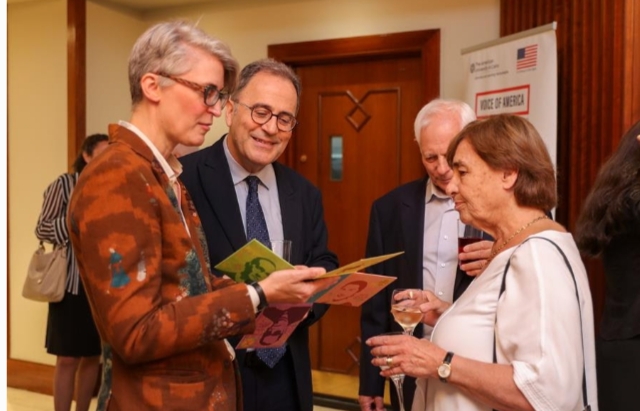The US Embassy in Cairo, in partnership with the American University in Cairo, has launched an online archive of several thousand reel-to-reel Arabic-language audio tapes highlighting the programming of Voice of America’s (VOA) Egypt branch.
The archive includes interviews with prominent Egyptian historical figures, musical programs featuring famed Egyptian and Arab singers, and news items focusing on Egypt and US programs in Egypt.
“Until now, these reel-to-reel tapes were not accessible to the public, as the equipment was not available at AUC and even if it were, playback would serve only one user at a time. This US Embassy grant has unlocked this rich resource to make it accessible online, serving not only Egyptian listeners but a global audience interested in Egyptian arts and culture,” said Ambassador John P. Desrocher, US Chargé d’Affaires.
Acting spokesman for the US embassy Khaled Wulfsberg said that the archive of Voice of America has been present at the American University since 2012, but there was difficulty in circulating it.
“So the idea came to open these recordings and publish them to be available online for anyone who wants to view them in any country worldwide,” Wulfsberg said.
“The work began on this project two years ago, specifically after the spread of Covid-19,” he noted.
Wulfsberg expects there will be great interest in this archive from audience, especially those who feel nostalgic.
“The archive is accessible for all,” he added.
Dating from the late 1970s through the early 2010s, the VOA archive includes thousands of interviews with prominent individuals in Egypt and the Arab world such as Nobel Laureate for Literature Naguib Mahfouz, famed film director Salah Abou Seif, and iconic comedian Adel Imam.
Special programs include spoken versions of works such as Abbas El-Akkad’s Sara, and documentary programs about legendary singer Umm Kulthum. Other content includes musical performances by Egyptian and Arab artists.
Public interest in Egypt’s history, society, and culture continues to grow, as demonstrated by history and arts programming in Egyptian and international media, and “nostalgia”-oriented social media sites.
While most online sources are visual or text-oriented, research requests received by AUC library staff indicates a thirst for audio resources as well. The US Embassy grant to AUC to digitize this resource allows users all around the world to have access and learn more about Egypt and the contributions of VOA in Egypt. The project was carried out by AUC’s Rare Books and Special Collections Library, which houses the VOA collection, and the library’s Digitization Center.
For over 50 years, the US Embassy in Cairo has supported Egyptian arts and culture through the Cairo Film Festival, Film My Design, and many other cultural events. Over the last 50 years the United States has contributed over $100 million to preserve Egypt’s cultural heritage including projects to protect sites such as the Sphinx and Kom Ombo Temple in Aswan.






Discussion about this post